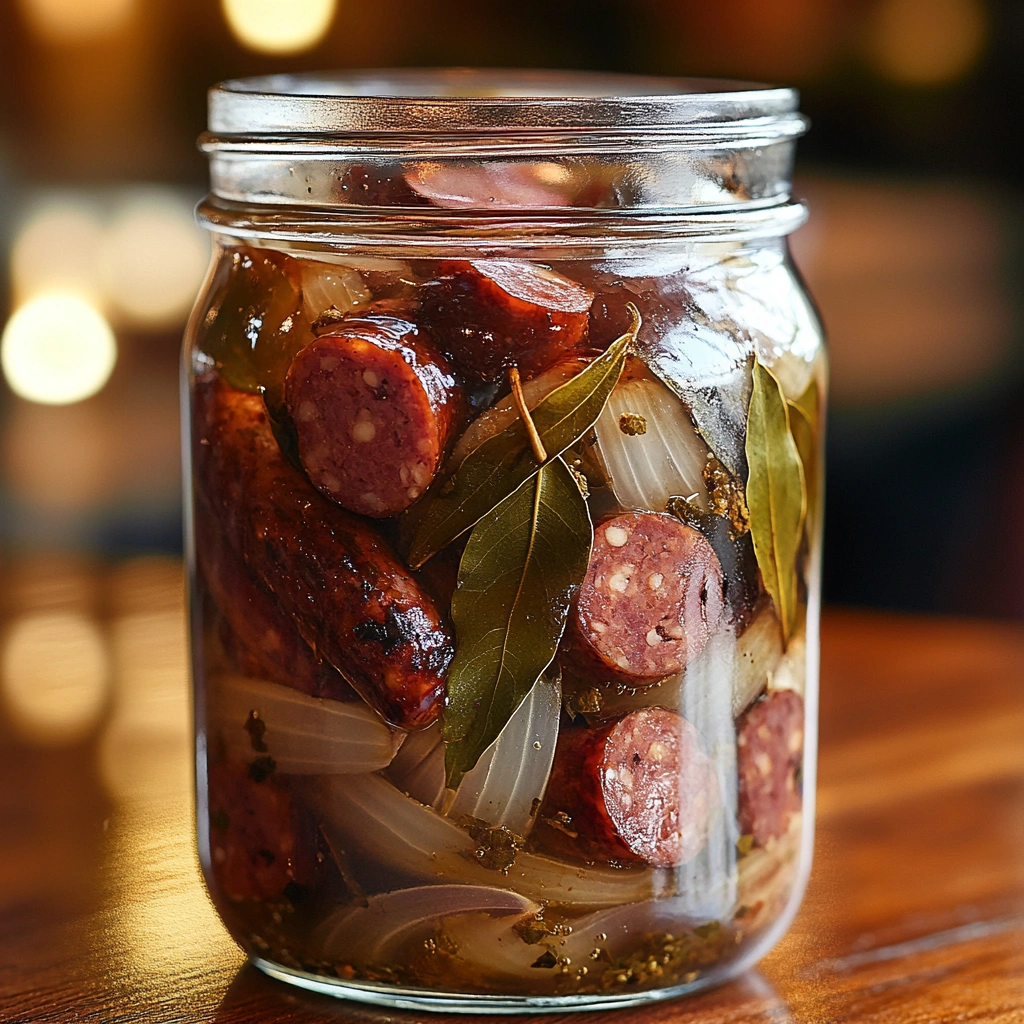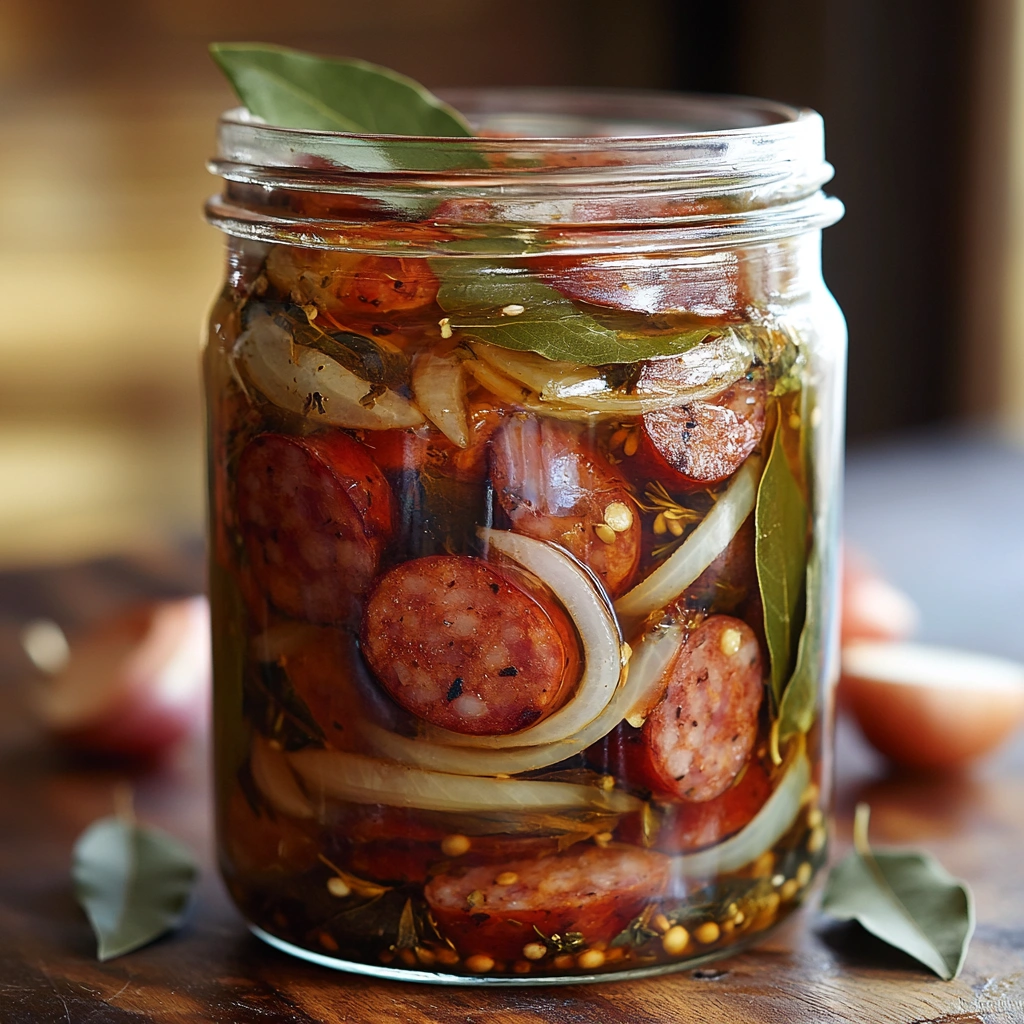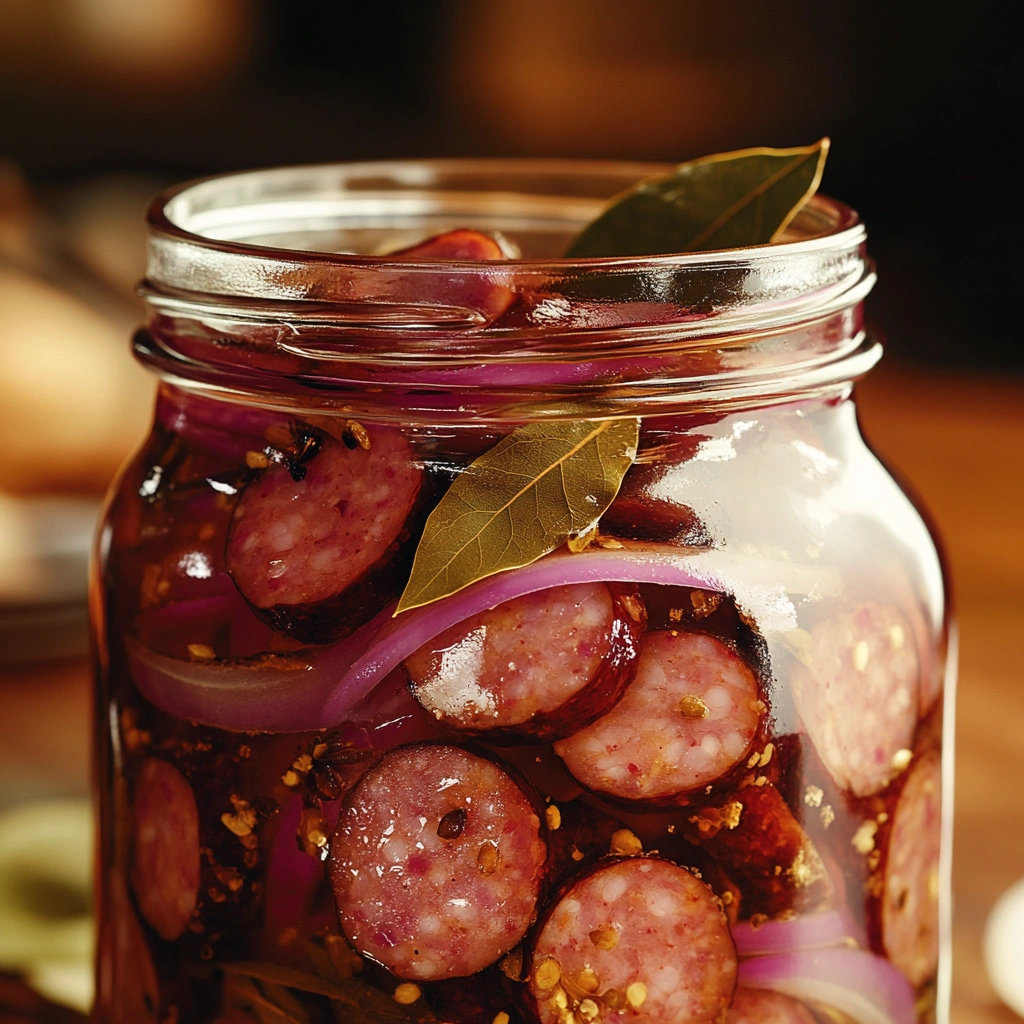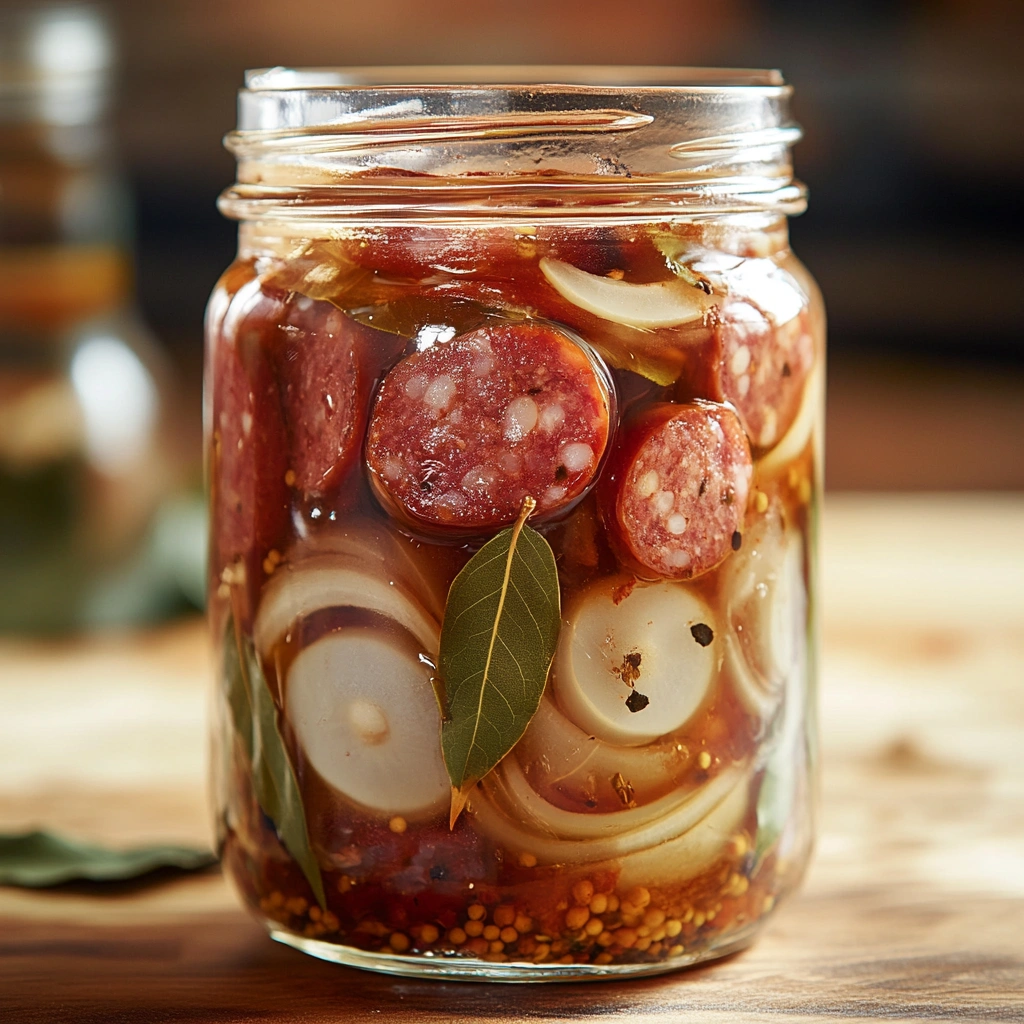Pickled sausages have long been a favorite snack for those who love tangy, savory treats. However, many wonder, “Are pickled sausages healthy?” In this detailed guide, we’ll break down the nutritional profile of pickled sausages, their health benefits, and potential risks.
Introduction: Are Pickled Sausages Healthy?
Pickled sausages are a convenient, flavorful snack commonly found in jars at convenience stores or homemade in kitchens. But are pickled sausages healthy, and how do they fit into a balanced diet? Let’s explore their popularity and why this question matters.
Exploring the Popularity of Pickled Sausages
Pickled sausages are widely enjoyed for their bold flavor, long shelf life, and portability. They’re a staple in southern cuisine and are often featured in snack bars or roadside eateries. Their tangy, spicy kick makes them a unique alternative to traditional sausages.
For easy recipes, visit Easy Pickled Sausage Recipe.
Why Ask, “Are Pickled Sausages Healthy?”
Despite their popularity, pickled sausages raise several health-related questions.
- Sodium Content: Pickling involves brining sausages in a salt solution, which can significantly increase sodium levels.
- Preservatives: Many commercial pickled sausages contain preservatives like sodium nitrate, which can have long-term health effects.
- Nutritional Value: Are pickled sausages healthy enough to be a regular snack, or should they be enjoyed in moderation?
These concerns make it essential to evaluate the ingredients and nutritional profile of pickled sausages.
What Does Nutrition Say About Pickled Sausages? Are Pickled Sausages Healthy?
To answer the question “Are pickled sausages healthy?” we need to examine their nutritional content.
The Nutritional Breakdown of Pickled Sausages
Pickled sausages are high in protein and fat, but their sodium levels are also worth noting. Here’s a general breakdown per 100-gram serving:
- Calories: 200–250
- Protein: 10–15 grams
- Fats: 15–20 grams (with 5–8 grams of saturated fat)
- Sodium: 800–1000 milligrams
While their protein content is beneficial for muscle repair and energy, the high sodium and saturated fat levels can pose risks if consumed frequently.
For more nutritional insights, check out Are Pickled Sausages Healthy? Nutrition and Tips.
Protein, Fats, and Sodium: Are Pickled Sausages Healthy for Everyday Consumption?
- Protein Benefits: The protein in pickled sausages can support muscle building and overall energy levels.
- Fat Concerns: High saturated fat levels may contribute to increased cholesterol levels if consumed in excess.
- Sodium Risks: With sodium content close to 40–50% of the daily recommended intake, pickled sausages should be enjoyed sparingly.
While they can be a tasty treat, moderation is key to avoiding potential health risks.
Sodium Levels and Health Risks: Are Pickled Sausages Healthy in Moderation?
One of the most debated aspects of pickled sausages is their sodium content. So, are pickled sausages healthy when it comes to sodium intake?
Why Pickled Sausages Are High in Sodium
Pickling involves submerging sausages in a brine made of vinegar, water, and salt. This process:
- Enhances shelf life by preventing bacterial growth
- Intensifies flavor with salt as a natural preservative
However, the downside is that this preservation method significantly increases sodium levels. A single serving of pickled sausage can contain almost half of the daily sodium allowance.
For storage tips, visit Do Pickled Sausages Need to Be Refrigerated?
The Impact of Sodium on Heart and Blood Pressure
High sodium intake has been linked to several health risks, including:
- Hypertension: Too much sodium may raise blood pressure, which heightens the risk of heart disease.
- Kidney Damage: Sodium overconsumption puts strain on the kidneys, which work to filter out excess salt.
Tip: If you’re watching your sodium intake, try making homemade pickled sausages with reduced-salt brine.

The Role of Preservatives: Are Pickled Sausages Healthy with Additives?
Commercially produced pickled sausages often contain preservatives to extend their shelf life and maintain color. But are pickled sausages healthy with these additives?
Common Preservatives Found in Pickled Sausages
- Sodium Nitrate: A common preservative used to prevent bacterial growth and preserve the sausage’s pink hue.
- Potassium Sorbate: Added to inhibit mold and yeast growth in the jar.
- Artificial Flavors and Dyes: Some brands use synthetic flavors or colors to enhance visual appeal and taste.
Do Additives Like Sodium Nitrate Make You Wonder, “Are Pickled Sausages Healthy?”
Sodium nitrate, while effective in preserving food, has been a subject of health debates. Studies suggest that excessive consumption of nitrates may:
- Increase the risk of certain cancers
- Contribute to oxidative stress in the body
To avoid these risks, consider choosing preservative-free or homemade pickled sausages. For an easy recipe, visit Homemade Pickled Sausage.
Long-Term Risks: Are Pickled Sausages Healthy for Your Heart?
When considering, “Are pickled sausages healthy?” the long-term risks, especially for cardiovascular health, play a significant role. Let’s examine how saturated fats and regular consumption affect heart health.
Saturated Fats in Pickled Sausages and Their Impact on Cardiovascular Health
Pickled sausages are often made using processed meats like pork or beef, which are higher in saturated fats. Here’s how this impacts cardiovascular health:
- Cholesterol Levels: Saturated fats can raise LDL (low-density lipoprotein) cholesterol, increasing the risk of heart disease.
- Arterial Blockage: Over time, plaque buildup from excessive saturated fat intake can lead to atherosclerosis, a condition that narrows and hardens the arteries.
Tip: To reduce the risks, opt for pickled sausages made with leaner meats like turkey or chicken, which naturally contain less saturated fat.
Are Pickled Sausages Healthy If Consumed Regularly?
Regular consumption of pickled sausages can lead to various health concerns, especially when paired with other processed foods. The potential risks include:
- Hypertension: Frequent intake of high-sodium foods like pickled sausages can increase blood pressure, putting strain on the heart.
- Weight Gain: The calorie density of pickled sausages, combined with their fat content, may contribute to weight gain if not balanced with physical activity.
While they can be part of a balanced diet, it’s essential to limit intake and monitor portion sizes to avoid these risks.

Cancer Concerns: Are Pickled Sausages Healthy or a Risk Factor?
Another key consideration when asking, “Are pickled sausages healthy?” is their association with cancer risks. Processed meats like pickled sausages have been the subject of numerous studies examining potential carcinogenic effects.
Processed Meats and Cancer: What Studies Say About Pickled Sausages
Research from the World Health Organization (WHO) and other studies links processed meats to certain types of cancer. Regular consumption of pickled sausages could increase the risk of:
- Colorectal Cancer: Nitrites used in pickled sausages can convert into nitrosamines during digestion, a compound linked to an increased risk of colorectal cancer.
- Stomach Cancer: The high salt content in pickled products has also been associated with a higher likelihood of stomach cancer.
While the occasional pickled sausage is unlikely to cause harm, reducing the intake of processed meats overall is recommended for long-term health.
The Role of Nitrates in Answering, “Are Pickled Sausages Healthy?”
Nitrates and nitrites are commonly used in pickled sausages as preservatives. They help:
- Maintain the sausage’s bright color
- Inhibit bacterial growth
However, excessive consumption of these compounds may lead to negative health outcomes. To reduce risks, look for brands labeled “nitrate-free” or consider homemade alternatives with natural preservation methods.
For a guide to making your own nitrate-free sausages, visit Homemade Pickled Sausage.
Weight Management and Calories: Are Pickled Sausages Healthy for Dieters?
Pickled sausages are a high-protein, high-fat snack that can impact your diet depending on your goals. Are pickled sausages healthy for those managing their weight? Let’s take a closer look.
Caloric Content of Pickled Sausages
Each pickled sausage contains approximately 200–250 calories, largely derived from fat and protein. While the protein content is beneficial for muscle repair and satiety, the calorie count can quickly add up if consumed in large quantities.
How to Fit Pickled Sausages Into Your Diet:
- Pair with low-calorie vegetables like celery or cucumber slices for balance.
- Limit intake to one sausage as a snack rather than a meal replacement.
Are Pickled Sausages Healthy for Weight Loss Diets?
Pickled sausages may not be the best choice for weight loss diets due to their:
- High-Fat Content: With 15–20 grams of fat per serving, they can quickly exceed your daily fat allowance.
- Low Fiber Content: The lack of fiber in pickled sausages makes them less filling compared to other snacks like fresh fruits or nuts.
Instead, consider healthier alternatives like lean chicken sausage or tofu-based snacks if weight loss is your goal.
The Benefits of Pickled Sausages: Are Pickled Sausages Healthy in Any Way?
Despite their risks, pickled sausages do offer certain benefits that can make them a convenient snack option when consumed in moderation.
Protein and Shelf Life: Why Pickled Sausages Are a Convenient Snack
One of the key advantages of pickled sausages is their long shelf life. Unlike fresh meat, pickled sausages can last for weeks or even months when stored correctly. Here’s why they’re beneficial:
- Protein Boost: With 10–15 grams of protein per serving, they’re an excellent choice for post-workout recovery or maintaining energy levels throughout the day.
- Portability: Their packaging makes them easy to carry, and perfect for road trips, camping, or other outdoor activities.
For proper storage tips, check out Do Pickled Sausages Need to Be Refrigerated?
When Can You Say, “Are Pickled Sausages Healthy for My Needs?”
Pickled sausages may fit into specific dietary needs when consumed occasionally and mindfully. Here are scenarios where they may be suitable:
- High-Protein Diets: If you’re focused on increasing protein intake, pickled sausages can complement your meals.
- Convenient Snacks: For those with busy schedules, their long shelf life and portability make them a practical option.
However, moderation remains key to enjoying these sausages without compromising your health.
Alternatives to Consider: Are Pickled Sausages Healthy Compared to Other Snacks?
When debating, “Are pickled sausages healthy?” it’s useful to compare them to other snacks. Whether you’re looking for lower-sodium options or more nutrient-dense choices, there are alternatives to consider.
Low-sodium or Poultry-Based Pickled Sausages
Poultry-based pickled sausages, such as those made with chicken or turkey, offer several advantages:
- Lean Protein: Turkey and chicken provide all the protein benefits of pork sausages but with less fat.
- Lower Sodium Varieties: Some brands now produce low-sodium versions, which can reduce the risk of hypertension and fluid retention.
Switching to poultry-based sausages or low-sodium alternatives allows you to enjoy the tangy flavor of pickled sausages with fewer health risks.
Homemade Versions: Are Pickled Sausages Healthy When You Make Them Yourself?
Homemade pickled sausages allow you to avoid processed ingredients and control the nutritional value. When you make them at home:
- You Avoid Artificial Preservatives: Instead of sodium nitrates, you can rely on vinegar and refrigeration for preservation.
- You Can Experiment: Customize spices and seasoning levels to match your dietary needs.
This approach makes it easier to fit pickled sausages into a healthy diet while avoiding common concerns about store-bought options.
Guidelines for Moderation: Are Pickled Sausages Healthy in Small Amounts?
Moderation is essential when enjoying pickled sausages. Knowing how often and how much to consume can help minimize potential health risks while still allowing you to enjoy this snack.
How Often Can You Eat Pickled Sausages?
Pickled sausages should be consumed sparingly due to their:
- High Sodium Levels: Excessive sodium can strain your kidneys and lead to water retention.
- Processed Ingredients: Consuming processed meats frequently has been linked to long-term health risks, including heart disease and cancer.
A general guideline is to enjoy pickled sausages once every 1–2 weeks and only in small portions. This allows you to enjoy their bold flavors while avoiding negative health impacts.
Portion Control and Practical Tips
Proper portion control is key to enjoying pickled sausages without overindulging. Here are practical tips:
- Cut Smaller Pieces: Instead of eating a whole sausage, slice it into small rounds and pair it with low-calorie snacks like carrots or cucumbers.
- Choose Reduced-Sodium Options: When buying store-bought versions, opt for brands that advertise reduced sodium.
- Combine with Balanced Meals: Pair pickled sausages with whole grains or fresh vegetables for a more balanced plate.
For additional ideas, visit Are Pickled Sausages Healthy? Nutrition and Tips.
Homemade Options: Are Pickled Sausages Healthy When Made at Home?
Crafting pickled sausages at home gives you complete control over the ingredients, allowing you to prioritize health and flavor.
DIY Recipe for a Healthier Version
Here’s a simple guide to making healthier pickled sausages:
Ingredients:
- 1 lb turkey or chicken sausages (fully cooked)
- 2 cups white or apple cider vinegar
- 1 cup water
- 1 tsp salt
- 1 tsp sugar
- 1 tsp mustard seeds
- 1 tsp crushed red pepper flakes (optional)
- 2 garlic cloves, thinly sliced
Instructions:
- Cook and Cool the Sausages: Start with fully cooked sausages. Allow them to cool to room temperature.
- Prepare the Brine: Combine vinegar, water, salt, sugar, and spices in a saucepan. Bring the mixture to a boil and let it simmer for 5 minutes.
- Jar the Sausages: Place sausages in a clean glass jar. Pour the brine over them until fully submerged.
- Refrigerate: Seal the jar tightly and refrigerate for at least 48 hours before consuming to allow flavors to develop.
This recipe significantly reduces sodium and eliminates preservatives, making it a healthier alternative to store-bought options.
Reducing Sodium and Preservatives
Homemade pickled sausages provide the opportunity to cut down on common health risks:
- Lower Sodium Content: Adjust the salt in the brine to fit your dietary needs.
- Avoid Additives: Skip artificial preservatives like nitrates, opting for natural pickling methods instead.
- Add Herbs for Flavor: Experiment with fresh herbs such as dill or parsley to enhance the flavor profile without increasing salt.
Final Thoughts and FAQs: Are Pickled Sausages Healthy?
To wrap up, let’s revisit the question: “Are pickled sausages healthy?” While they can be a flavorful, high-protein snack, their sodium and fat content mean they should be enjoyed sparingly. Below are answers to some frequently asked questions.
Are Pickled Sausages Healthy If You Have Dietary Restrictions?
The suitability of pickled sausages depends on your specific dietary needs:
- Low-Sodium Diets: If you need to limit sodium, pickled sausages may not be the best choice. Opt for homemade versions instead.
- Low-Fat Diets: Their saturated fat levels might not align with certain heart-healthy eating plans.
- Gluten-Free Needs: Some commercial brands may include fillers that contain gluten, so always check labels carefully.
What Are the Healthiest Ways to Enjoy Pickled Sausages?
To make pickled sausages a healthier part of your diet:
- Focus on Portion Sizes: Enjoy small portions to keep sodium and calorie intake in check.
- Incorporate Balanced Pairings: Combine them with whole-grain crackers, fresh vegetables, or a light salad.
- Drink Water: Staying hydrated can help balance out the effects of sodium.
Should You Limit Pickled Sausages in Your Diet?
Yes, pickled sausages should be limited due to their high sodium and fat content. However, occasional indulgence can be part of a balanced diet when paired with other nutritious foods and mindful portioning.
Conclusion
Are pickled sausages healthy? While they offer some benefits, including a high protein content and long shelf life, their drawbacks—like excessive sodium and saturated fats—make moderation crucial. Homemade versions provide a better alternative, giving you control over ingredients and health risks.
For more inspiration on crafting flavorful, health-conscious meals, visit Bon Appétit’s Healthy Recipes.


